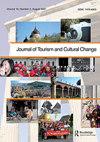Multiculturalism in Japan halal tourism: localizing the concept of halal
IF 2.5
4区 管理学
Q2 HOSPITALITY, LEISURE, SPORT & TOURISM
引用次数: 1
Abstract
ABSTRACT Since 2014, Japan has been developing halal tourism in order to increase the number of tourists. The halal tourism project emphasizes Japan’s need to understand the halal concept in order to provide appropriate facilities. This research discusses how the halal concept as a foreign culture is understood to provide Muslim-friendly facilities and halal products’ guarantee. This study uses mixed methods: data were taken from the halal signifier pictograms in restaurants, collected from the Japan National Tourism Organization (JNTO) and Japan Muslim Guide websites. In addition, the data related to several halal products were also taken from the ‘Japan Halal’ Facebook account. The types and the quantity of pictograms used in restaurants that are recommended by JNTO and Japan Muslim Guide were interpreted to discover how the halal concept is understood in Japan using a multiculturalism framework. This study found that the concept of halal is understood through, and has been adapted to, Japanese local values: the acceptance of halal concept as foreign culture in Japan’s halal tourism is carried out through localization of the concept. Localizing the halal concept provides a strong contribution to tourist destination country, in this case, Japan, as a non-Muslim majority country, to be more attractive to the Muslim tourist in terms of the Japan’s ability in providing the halal facilities for the Muslims while also still showing Japan’s characteristic on its culture.日本清真旅游中的多元文化主义:清真概念的本土化
摘要自2014年以来,日本一直在发展清真旅游,以增加游客数量。清真旅游项目强调日本需要了解清真概念,以便提供适当的设施。本研究探讨了如何理解作为外来文化的清真概念,为穆斯林友好设施和清真产品提供保障。这项研究使用了混合方法:数据取自餐馆中的清真符号象形图,这些象形图来自日本国家旅游组织(JNTO)和《日本穆斯林指南》网站。此外,与几种清真产品有关的数据也取自“日本清真”Facebook账户。对JNTO和《日本穆斯林指南》推荐的餐馆中使用的象形图的类型和数量进行了解释,以了解在日本如何使用多元文化框架来理解清真概念。本研究发现,清真的概念是通过日本本土价值观来理解的,并且已经适应了日本的本土价值观:在日本的清真旅游中,清真概念作为外国文化的接受是通过概念的本地化来实现的。清真概念的本地化为旅游目的地国家做出了巨大贡献,在这种情况下,日本作为一个非穆斯林占多数的国家,在为穆斯林提供清真设施的同时,仍然显示出日本的文化特色,从而对穆斯林游客更具吸引力。
本文章由计算机程序翻译,如有差异,请以英文原文为准。
求助全文
约1分钟内获得全文
求助全文
来源期刊

Journal of Tourism and Cultural Change
HOSPITALITY, LEISURE, SPORT & TOURISM-
CiteScore
5.10
自引率
9.10%
发文量
31
期刊介绍:
Journal of Tourism and Cultural Change ( JTCC ) is a peer-reviewed, transdisciplinary and transnational journal. It focuses on critically examining the relationships, tensions, representations, conflicts and possibilities that exist between tourism/travel and culture/cultures in an increasingly complex global context. JTCC provides a forum for debate against the backdrop of local, regional, national and transnational understandings of identity and difference. Economic restructuring, recognitions of the cultural dimension of biodiversity and sustainable development, contests regarding the positive and negative impact of patterns of tourist behaviour on cultural diversity, and transcultural strivings - all provide an important focus for JTCC . Global capitalism, in its myriad forms engages with multiple ''ways of being'', generating new relationships, re-evaluating existing, and challenging ways of knowing and being. Tourists and the tourism industry continue to find inventive ways to commodify, transform, present/re-present and consume material culture. JTCC seeks to widen and deepen understandings of such changing relationships and stimulate critical debate by: -Adopting a multidisciplinary approach -Encouraging deep and critical approaches to policy and practice -Embracing an inclusive definition of culture -Focusing on the concept, processes and meanings of change -Encouraging trans-national/transcultural perspectives
 求助内容:
求助内容: 应助结果提醒方式:
应助结果提醒方式:


